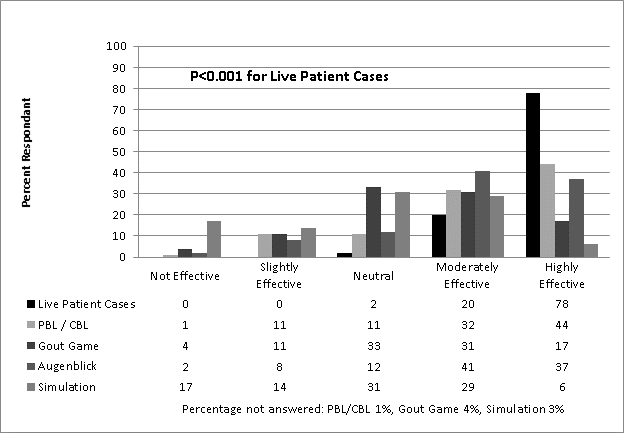Session Information
Date: Tuesday, November 10, 2015
Title: Education Poster II
Session Type: ACR Poster Session C
Session Time: 9:00AM-11:00AM
Background/Purpose:
At the University of Nebraska College of Medicine (COM),
rheumatology is taught in a block to second year medical students (M2s). The
educational content was revised significantly in 2014. In addition to standard
lectures, the following techniques were employed: faculty led live rheumatology
patient encounters, student and faculty led problem and case based learning
(PBL/CBL), student and faculty led Augenblick cases (pathognomic rheumatology findings),
video game on gout, and independent time in the simulation lab for joint
injections.
We desired to obtain student feedback regarding these
teaching modalities in order to improve undergraduate rheumatology education
moving forward.
Methods:
Upon completion of the rheumatology examination, students
were asked to answer a voluntary 30 question evaluation. No evaluation was
reviewed until final grades were determined by a grading committee. Students
were asked to rate the effectiveness each teaching method using a Likert-scale
response, and were given space to provide comments as free text. Free text
comments were reviewed qualitatively for prominent themes.
A chi-square test was done to compare the different teaching
methods, and was adjusted for multiple comparisons.
Results:
We received voluntary survey data from 114 of the 124
students participating in the block (92% response). M2 students ranked the
rheumatology block the highest among all of those evaluated for the 2014-15
academic year.
Results are summarized in Table 1. Live patient encounters
were deemed by students to be significantly more effective than all other
modalities (p<0.001). With the exclusion of the simulation lab, at least
50% of the students felt the methods implemented were moderately to highly
effective. Several themes emerged from the qualitative review of more than 17
pages of written feedback including: “appreciation for efforts incorporating
new learning experiences” and universally positive feedback regarding
faculty-led patient encounters.
Conclusion:
With a voluntary survey response rate of 92%, COM students
were invested in improving learning opportunities in rheumatology. In addition
to the standard lecture format, students were receptive and positive toward the
novel educational methods employed. Our experience suggests that our recently
developed rheumatology curriculum, blending both traditional and novel teaching
methods, is highly effective in engaging medical students. Of the modalities
employed, faculty-led live patient encounters appear to be particularly appealing
to trainees early in rheumatology learning. With ongoing threats to a
sustainable rheumatology workforce, it is vital that training curricula engage
students early with goals of knowledge acquisition and learner satisfaction.
Table 1:
Survey Results
To cite this abstract in AMA style:
Cannella AC, Moore GF, Mikuls TR, O'Dell JR, McBrien SB, Hearth-Holmes M, Klassen LW, Snow MH, Feely MG, Fowler ZD, Burchell M, Erickson AR. Teaching Rheumatology in Undergraduate Medical Education: What Are the Students Saying? [abstract]. Arthritis Rheumatol. 2015; 67 (suppl 10). https://acrabstracts.org/abstract/teaching-rheumatology-in-undergraduate-medical-education-what-are-the-students-saying/. Accessed .« Back to 2015 ACR/ARHP Annual Meeting
ACR Meeting Abstracts - https://acrabstracts.org/abstract/teaching-rheumatology-in-undergraduate-medical-education-what-are-the-students-saying/

